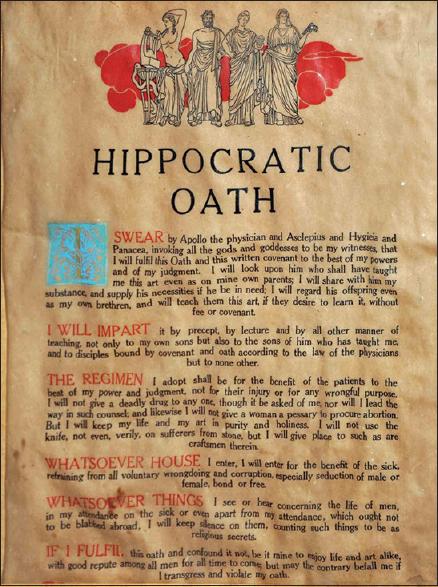
3 minute read
Euthanasia and the Hippocratic oath
diagnose the illness. From that point, psychologists have had the correct procedures to testify about mental illness in criminal cases.
Thanks to the Jenkins case, the APA program was formally finalised and used as an essential tool for using the appropriate psychological research in criminal cases. It has now been used in 200 federal and state cases ranging from child abuse, hospital rights, disabilities and sexual orientation.
Advertisement
By Nuha Kidwai, Year 10 North London Collegiate School Dubai
The Hippocratic Oath, otherwise known as the core of medical practice; is a pledge made by physicians to uphold specific ethical standards within medical practice, such as doctorpatient confidentiality and non-maleficence. In numerous regions, physicians are required to take the Hippocratic oath, and violating the oath’s principles has repercussions of suspension of medical practice or arrest. However, as of recent, opinions of whether euthanasia is compatible with the Hippocratic oath has begun to vary, and now, many have begun to question whether euthanasia and physician assisted suicide truly violate the principles of the Hippocratic oath, which has been undertaken by over 6 million doctors worldwide.
Most arguments which state that euthanasia violates the Hippocratic oath, and is thus unethical, due to it breaching the basis of medical ethics solely revolve around the two principles of the oath. The first principle of the oath states ‘first, do no harm’. Through delivering
euthanasia or physician assisted suicide (PAS), a doctor has to administer a lethal drug, consisting of Pavulon, which causes muscle paralysis and respiratory arrest, potassium chloride to cause asystole and midazolam to sedate the patient. This administration of lethal drugs, as well as violating the clause of ‘I will not give a lethal drug to anyone if I am asked, nor will I advise such a plan’ within the
oath, causes maleficence, as it does harm by causing the body’s organs to deteriorate and simply by taking a human life, thus violating the oath. Further, upon the ideas of beneficence and nonmaleficence, through providing euthanasia and physician assisted suicide, doctors violate beneficence as they are ultimately killing and exterminating a human life. The argument of euthanasia and PAS
violating the Hippocratic oath, and thus the foundational medical ethics, demonstrate that euthanasia and PAS is unethical, and is therefore justified in being illegal in numerous countries such as the United Kingdom. Yet, it is evident the arguments which contend euthanasia as unethical due to it violating the Hippocratic oath, are limited in number, obviously outdated, and fail to see euthanasia through other perspectives.
Modern arguments, which are more widely accepted, clearly demonstrate that the Hippocratic oath is not violated through euthanasia and PAS and is thus ethical. Firstly, although outdated arguments suggest euthanasia and PAS does harm, as it terminates a human life and ceases the human body from functioning, it is moreso evident that euthanasia and PAS do not harm, and instead do good, therefore following, and not violating the Hippocratic oath. This is because euthanasia and PAS are used in conditions where there is terminal suffering, and even palliative care has failed to enable the patient to withstand the pain they experience. Therefore, euthanasia and PAS aids to prevent the elongation of a patient’s suffering, and to stop patient’s from experiencing further complications as their conditions worsen. Most euthanasia patients are already determined to die in a short period of time, and thus euthanasia and PAS aids to prevent the painful final stages of terminal illnesses. This demonstrates that aiding a patient in euthanasia or PAS is ‘doing no harm and doing good’ as it assists in preventing the patient from experiencing further pain and suffering.
This does good for the patient, by ending their suffering, and does not harm, as it prevents the patient from gaining complications within the final stages of their life. This signifies that euthanasia and 22
PAS do not violate the Hippocratic oath, and instead abide by the principles within the oath. Finally, and the most obvious argument, is the question of whether the Hippocratic oath; seen as the centre of medical justice, which was created 2400 years ago should even be abided by today. This is because using the oath, which was created at a time of extremely limited medical development, would be an inappropriate standard for evaluating medical policies today.
Many aspects of the oath, such as not doing surgery have already been eliminated. Therefore, surely the oath should not even be placed into consideration when evaluating the ethics of euthanasia? These arguments clearly highlight that euthanasia does not violate the oath, and even if it does so, the Hippocratic oath should not be of enough relevance to prevent euthanasia and PAS.










